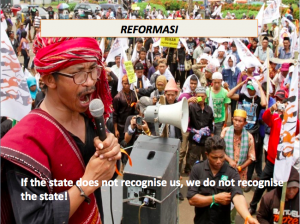Reported by Adinda Rizky Herdianti
FKP in March 2017 was hosted by Universitas Syiah Kuala and Universitas Andalas. One event was held in each Banda Aceh and Padang (during the FKP Roadshow) and two events in Jakarta at LPEM FEB UI. On Tuesday, 14 March 2017, the FKP presentation was by Dean Affandi from Social and Political Science Graduate Research Program, Universitas Indonesia, on “The Struggle over Adat Forest Right in Upland Banten”. The study, which he conducted as part of his doctoral program at Monash University, focused on the strategies of Kasepuhan people in Banten to gain rights and access to their customary land in the midst of political and socio-economic changes.
Rooted from the colonial era, for decades the Indonesian state has had the sole authority to allocate the function and utilisation of forest lands and resources. Thus around 74% of Indonesia’s total land area is declared as ‘State Forest Territories’. As such, the state ignored customary communities’ access and management rights as stated in customary adat laws, therefore many communities lost their rights to forest lands on which their livelihood depended. Furthermore, under the New Order regime, forest, mineral, and marine resources were exploited extensively to serve the pursuit of export-led growth. However, little of the benefits accrued to the local level, to local/adat communities or to local governments; instead, the benefits largely flowed to businesses and elite circles with close ties to the country’s military leadership.
In the wake of the downfall of New Order regime, many laws were revised to redefine Indonesia’s political landscape, including forest management-related laws. The Constitutional Court (Mahkamah Konstitusi) underwent a judicial review of articles in Forestry Act 41/1999 in 2012. The judicial review finally recognized adat people rights to forest lands and separate adat forest and state forest. The lingering question after the judicial review was how adat people (Kasepuhan people, in this research context), responds to this change.
Kasepuhan people, which claim settlement in the area since 1368, is the first adat community to regain their rights to customary land as a result of the Constitutional Court decision. Dean Affaindi explored some of the ways with which the community took advantage of the Court decision to wrestle the rights away from the Ministry of Forestry. Contrary to popular judgment of adat people, Kasepuhan people embrace modernity and democratic principles, and are able to translate between traditional and modern development. Many of them join the bureaucracy and organized themselves by establishing SABAKI and work closely with NGOs in order to regain their land.
Even when an adat groups regain land access, there are questions on the social and environmental management of the land. Is there elite capture, where proceeds from land management are enjoyed only by the community elites? Small scale mining is also rampant in the Kasepuhan area after the adat group regain land rights, where non-sustainable mining methods are used with negative environmental consequences.
Indonesia still has to work on setting up national framework for advancing both adat rights and good land management. Many more land areas are in the process of being transferred and the future development of Indonesia rely on having the lands managed in a sustainable and equitable manner.






Kaum elite bertindak atas nama masyarakat adat. Adakah mereka menghendaki adanya perubahan